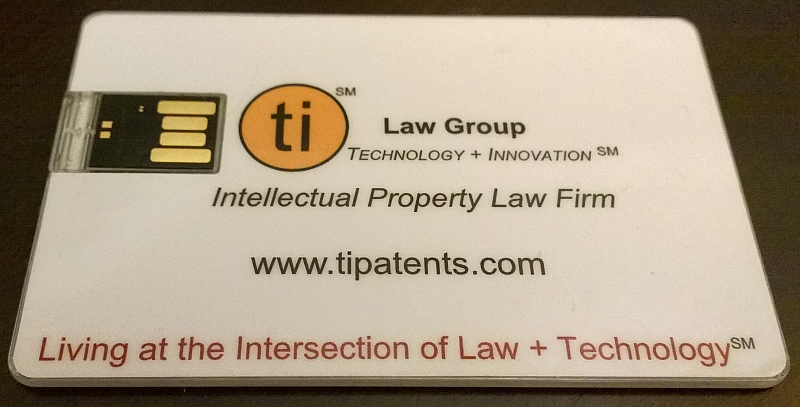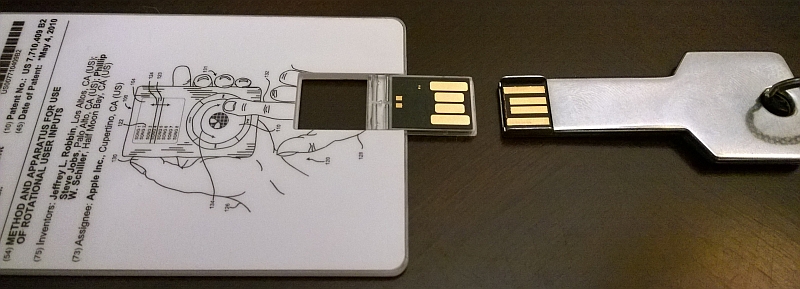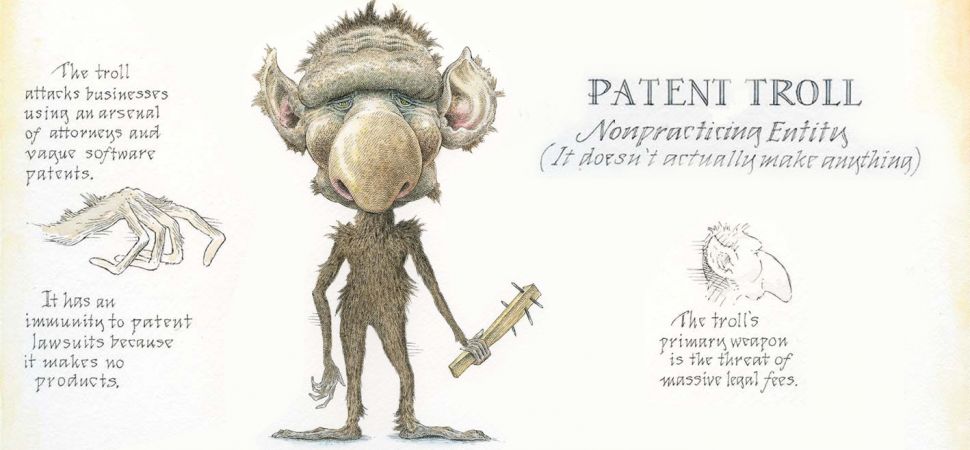Mystery solved, and a little about tech patents

Remember that thing? Jet brought it in, I put it up on the screen in class, showed that it had the removable card and the patent for Apple’s rotational user input on the back , and guessed it was a very clever business card for a law firm that deals with patents and intellectual property. I was right about the business card, and you can read the full patent it displays at this link, and see a brief with the image of the device here in .pdf form. I just needed to figure out what the removable card was.
When I got it home, I realized the smaller card wasn’t removable, it just flipped out, and then it became clear what was going on – it’s a flash drive! Or thumb drive. Or USB drive. Or jump drive. Or whatever you call it, it’s one of those. 2 gigabyte flash drive no less, and even comes with a .pdf primer on patents – try saying that three times fast. If you compare the connectors to the USB drive I use for the class presentations, you can see it’s essentially the same. To be specific, it’s what’s known as a ‘Type A‘ connector even though it’s not enclosed as is typical. The two center pins are the channels through which data is transferred, and as is very common with data channels of all types, one is positive and one is negative.
This has to be one of the most clever and innovative business cards I’ve ever seen, it’s very inventive and frankly I plan on using it as an example in future classes. Plus, I can use it, and if it’s ever lost or stolen someone would be afraid to use it because it’s from a law firm! Well, maybe that wouldn’t deter them, but it’s an added layer of security. It’s so light it can be used without support, as you can see in this (very dark) image that shows it plugged into the side USB port of my Surface.
But because this is the business card of a patent law firm, it also lets me offer an introduction to the idea of intellectual property, trademarks, and patents in the tech industry. I don’t want to go too deep into it now because we have a whole class covering the topic and we will talk a lot about it towards the end of the semester, although in a way the conversation has already begun. In essence, when we talk about intellectual property (IP) or patents, what we mean is something you create or develop or invent and the establishment of your ownership of that creation, or design, or process, or thing, or whatever it is. This often takes the form of licensing fees, which is standard practice; For every Blu-Ray disc or player manufactured, Sony gets a fee. For every Android handset sold, Microsoft gets a fee. For (almost) every HTC phone sold, Apple gets a fee. And the list goes on and on.
There has been a big debate over what is and isn’t patentable, what should and shouldn’t be patentable, and what to do if you feel someone is using your idea without recognition or compensation. If you don’t think it could possibly be that big of an issue, remember that for some companies, their most lucrative – or only – product is its patents and patent portfolio.
So important are patents and the revenue they can generate, especially in the tech industry, that lawsuits happen ALL THE TIME. I’m normally against using bulleted lists for anything when writing, but I think here it’s warranted. Behold, just a few of the recent, and one not-so-recent, tech-industry patent/trademark/IP fights that have happened:
- Apple sues Samsung
- Samsung sues Apple
- Microsoft sues Samsung
- The Beatles sue Apple
- Oracle sues Google
- Apple and Microsoft sue Google
- Google sues Apple (Like all good wars, this actually ended in a truce)
- Google sues Microsoft
- Microsoft and Google sue the government (not a patent issue, just thought I’d throw it in there)
- NVidia sues Samsung *and* Qualcomm
- Bose even sued Beats
These are all recent, and only a few, but this has been going on for years. Many years. This link has 1188 pages of tech-industry patent and trademark lawsuits, and it only goes back to 2003! In fact, according to legal analytics firm Lex Machina, the top 10 targets of patent lawsuits in 2013 were tech firms, with Apple at the top of the list.
Even so, if you have developed something that makes a significant contribution to society, science or industry, you need to fight to keep that patent under your wing and in your portfolio, especially if it’s widely used. I like to think that most companies aide by patent laws (in fact, I was just today reading an article on Tom’s Hardware about building a budget PC, and the liquid-cooling unit they recommend hasn’t been released yet in the U.S. because of unspecified patent issues and a required redesign based on them).
However if you don’t watch your patents carefully, less scrupulous actors could hijack them and claim them as their own, or not pay the licensing fees, or make a knockoff and claim it as original. This also leads to a discussion of something very nefarious in the discussion of patents, something known as patent trolls; companies that create no products, but rather endlessly sue everyone, using questionable legal tactics, over patents they supposedly own. Luckily, they usually get slapped down pretty hard. Prenda Law is the most well-known and loudmouthed patent troll, although because of repeated and brutal defeats in court they’re somewhat quiet as of late. There are others, but it appears what happened to Prenda has made them afraid, with good reason. There are even sort-of patent trolls. The fact is, justified or not, it can be lucrative.
There have been loud calls for reform of patent laws. For example, some say it shouldn’t be possible to patent, say, rounded corners, or taking a photograph of something in front of a white background, or patent something that has been standard practice for centuries but now you’re “doing it on a computer,” which the Supreme Court has said is not enough. It’s very complex and convoluted, and from what I can tell it doesn’t appear there will be a change anytime soon.
I don’t mean to imply that all patent lawsuits are frivolous, not at all; patent ownership is important for the people who own patents. But as patent trolls illustrate, many of them are frivolous, and it’s unfortunate, because lawsuits like this can really stifle creativity and innovation in that case. It’s just that there are so many, it’s hard to separate what’s legitimate form what’s trolling.
You’ll notice we have a whole class on ‘Ethics, Crime, and Security.’ It is there that we will talk extensively about copyright, intellectual property, trademarks, domain squatting, and the general reality that the Internet has always been a haven for theft of not just goods such as songs or videos, but of ideas and attributions. In any industry it is absolutely vital to watch over your patents and ensure that others who use them, which in the tech industry could be a very large number of players, is doing so within their, and your, rights.




